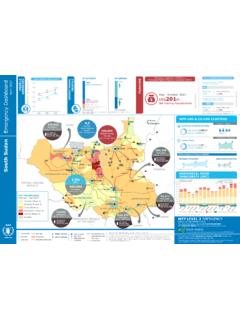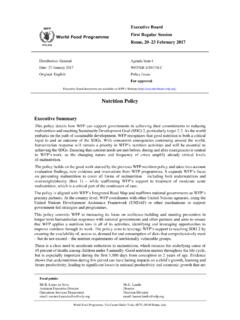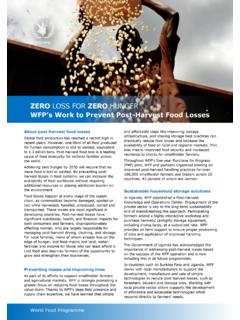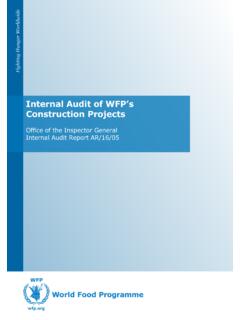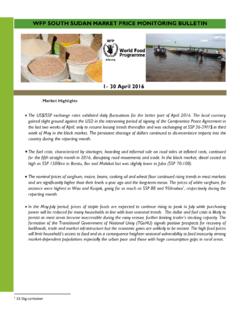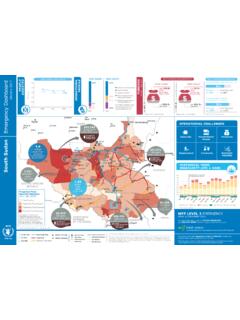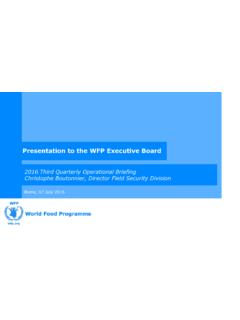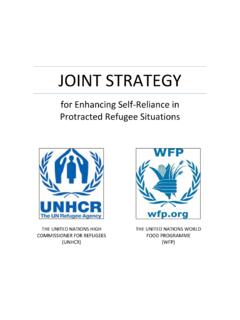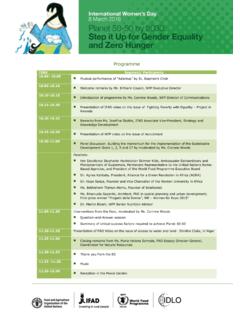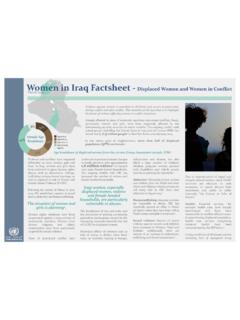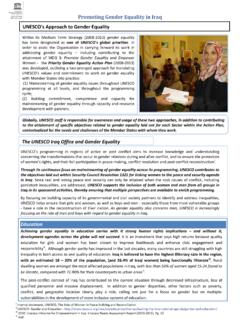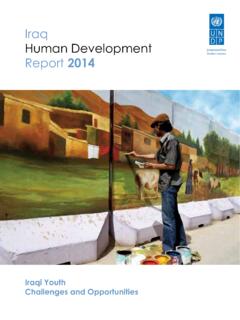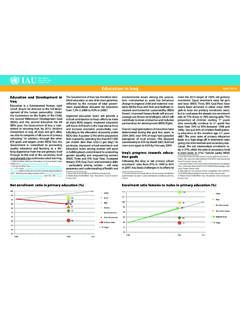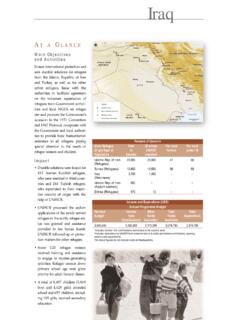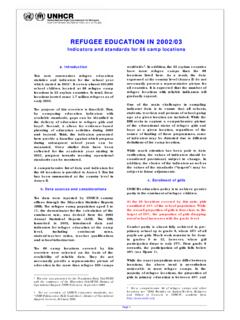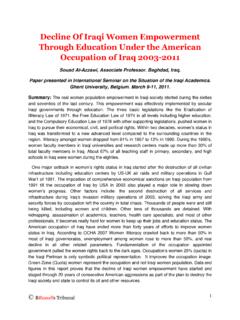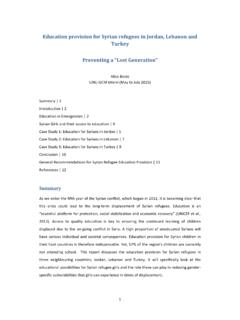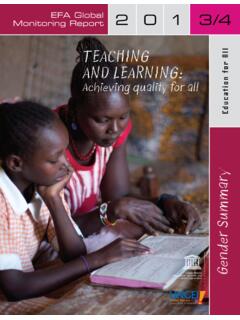Transcription of School feeding programmes - documents.wfp.org
1 School feeding programmes In Regional Bureau Cairo (RBC) region Background School feeding is a cornerstone of WFP assistance in the RBC region, providing a strategic catalytic inter-vention that can help deliver multiple benefits in sup-port of childhood education and nutrition, and serve as part of national social protection and social safety net systems and services. RBC is currently implementing School feeding activities in fourteen countries, one of the largest concentrations of School feeding programmes implemented by WFP globally.
2 In total, million children were reached and assisted by WFP in the region in 2014. This is expected to grow during 2015, to reach some 4 million children, including in support of those in or exposed to conflict situations. WFP s interventions are directly benefiting School chil-dren with meals or snacks in Algeria, Armenia, Egypt, iraq , Iran, Jordan, Kyrgyzstan, Palestine, Sudan, Syria, Tajikistan and Yemen. Furthermore, in Tunisia and Morocco WFP is closely working with the Ministries of education by providing support to strengthen national School feeding programmes .
3 RBC pursues innovative partnerships through which WFP is able to implement multi-year capacity development and technical assistance interventions. This allows for systemic and coordinated approaches to School feeding Fighting Hunger Worldwide and national capacity development, including the strengthening of national programmes as well as pro-moting the gradual integration and hand-over of WFP s School feeding activities within national programmes . As described in more detail below, in addition to the partnerships with other UN agencies, RBC has devel-oped a unique partnership with the Russian Federation which allowed for the development of School feeding activities with a regional scope.
4 WFP is also actively working to ensure that School feeding programmes are framed and leveraged as so-cial protection and safety net interventions that con-tribute to stabilizing complex situations, including in conflict affected areas. This approach has allowed School feeding to become a catalyst for wider social and economic stabilization, as well as for early recov-ery and development efforts in the region. As it implements its School feeding programmes in the RBC region, WFP promotes a broad set of often inter-linked objectives, including: combating inadequate nu-trition and lack of diversity in children s diets; increas-ing girls School attendance and retention; promoting local production and creating markets for local farmers which provide jobs for women and ensure protection for the most vulnerable families.
5 Photo: Micah Albert live on 3% of the land Promotion of girls education : WFP RBC supports girls by means of School meals and take-home ra-tions. The incentive is designed to encourage girls enrolment in primary schools and keep them at-tending class regularly. One successful example of this initiative in the region is the use of take-home rations as a means to promote girls education among refugee children in Iran, as well as in the countries of Sudan and Yemen, where educational gender gaps are high.
6 Fighting Child Labour In Egypt: WFP signed a cooperation agreement with the European Union for a 60 million euro four-year project, Enhancing Ac-cess of Children to education and Fighting Child La-bour, in July 2014. The project will reach up to 100,000 children and 400,000 family members an-nually, and is being rolled out in areas where pov-erty and food insecurity are the highest. Improving School age children s nutritional status: Whenever the opportunity arises, WFP strives to support governments in promoting a stronger School feeding - nutrition nexus.
7 In Sudan and Yemen, WFP has been actively en-gaged with government authorities in addressing inadequate nutrition among School age children through various strategies. With technical support from the Global Alliance for Improved Nutrition (GAIN). WFP in Yemen is looking into the most appropriate ways to address nutritional needs by providing School snacks and meals as well as other comple-mentary activities in areas of health, washing, and Working in areas of conflict and supporting childhood education and nutrition: In the RBC region, WFP plays an increasing role in tar-geting School children exposed to protracted in-stability and the consequences of conflict.
8 By doing so WFP contributes to the protection of children and the preservation of human capital, while promoting educational and nutritional out-comes. In Syria, part of the Lost Generation cam-paign, WFP launched a School feeding pro-gramme in August 2014 to boost enrolment and attendance rates, while contributing to an im-proved micronutrient intake. Starting with an initial 1,500 children in the summer School clubs, the programme has significantly scaled-up to reach 111,500 children in Aleppo, Hama, Rural Damascus and Tartous.
9 Children receive a daily snack of 80 grams of micronutrient fortified date bars on each School day. In 2015, the School feeding programme aims to reach 500,000 pre-primary and primary School children in districts with a high concentration of internally displaced persons, high food insecurity and low education indicators. Participating schools are selected in coordination with UNICEF to ensure a compre-hensive package of support. In Palestine and Sudan WFP is conducting sim-ilar interventions with the objectives of improv-ing access to basic services to alleviate short term hunger, contributing to learning and creat-ing an enabling environment that promotes gen-der equality and enhances students concentra-tion levels.
10 Key features Photo: WFP Kyrgyzstan Partnerships and collaborations with UNICEF, UNESCO and FAO: RBC invested in strengthening partnerships with UNICEF in order to achieve School feeding objectives in a holistic way, aligned with overall support provided to the education sector. Partnerships with UNICEF are ongoing in support of joint advocacy, design and implementation of pro-grammes in Algeria, Egypt, Palestine, Kyrgyz Republic and Tajikistan. WFP engaged UNICEF in newly launched School feeding programmes in iraq and Yemen and is now working on establishing active partnerships with UNICEF in Armenia, Jor-dan and Sudan.
